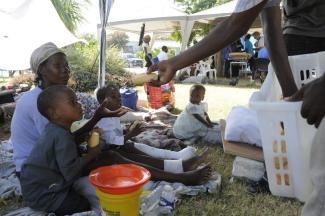International cooperation
The dark side of aid

On 12 January 2010, Haiti was rocked by a devastating earthquake. According to estimates, 222,750 people lost their lives and 313,000 buildings were seriously damaged or destroyed. Many non-governmental organisations (NGOs) and international organisations (IOs) came to Haiti to offer help and rebuild houses, schools, government buildings and hospitals. They encountered a large number of helpers who were already on site. In Haiti, the volume of official development assistance (ODA) regularly exceeds the volume of the government budget. After the earthquake, the amount of international assistance was about four times as high as the budget.
Reconstruction was far from complete when Hurricane Matthew hit Haiti in October 2016 and destroyed even more infrastructure. Five hundred forty-six people lost their lives. Around 4.4 million people – almost half of the population – are currently suffering from food insecurity, 1.3 million acutely. Apart from these enormous humanitarian challenges, Haiti must rise to a large number of development challenges. The country ranks 163rd out of 187 countries on the Human Development Index.
Haiti consistently depends on external help to an exceptionally large degree – and the international community wants to do its part. Yet, the employees of international organisations have a difficult relationship with the local people. This situation has consequences for the work of IOs, who administer the lion’s share of international aid.
The University of Potsdam runs a project called “Governance in areas of limited statehood”. Affiliated researchers conducted interviews with IO staff involved in food-security issues in Haiti. The IOs included the World Food Programme (WFP), the Food and Agriculture Organization of the United Nations (FAO), the Inter-American Development Bank (IDB), the World Bank and the European Union. Several employees criticised aid recipients as having exaggerated expectations. Moreover, they mentioned lack of capacities and political will on the side of the Haitian government.
The researchers noticed that many employees seemed irritated, angry, frustrated and sometimes resigned. They had come to Haiti to help, but in their eyes, their aid projects were only making very slow progress or none at all. Often the project partners did not really seem to want to cooperate. Numerous initiatives appeared to be petering out into nothing. Moreover, the IO employees had the impression that they were not perceived as helpers whose efforts the people were thankful for. Just the opposite, in fact.
Haitians clearly feel major resentment towards the IOs. The reasons for this attitude can be found in the country’s colonial history, the extreme inequality between IO employees and Haitians and the notoriously bad image Haitians have of the UN peace-keeping mission.
In the 18th century, Saint-Domingue, as Haiti was then called, was France’s richest colony. The French were driven out by a revolution. However, this slave revolt – the only successful one in history, by the way – did not lead to real political independence, and even less to economic sovereignty. Even today, two-thirds of the people earn their income from agricultural exports, especially coffee. The majority of them live under the poverty line. The legacy of colonialism is still felt acutely.
Together with Namibia and South Africa, Haiti is one of the three countries in the world with the worst income inequality, as measured by the Gini coefficient. In contrast, IO employees from abroad are wealthy. Most of them live in Petionville, the richest part of the capital Port-au-Prince, where a parallel world has emerged that consists of privately guarded housing complexes, chauffeurs, clubs and expensive supermarkets.
UN peacekeepers were supposed to restore human security. However, the mission brought cholera to Haiti shortly after the 2010 earthquake, contributing to the negative image of foreigners. Over 9,000 people died in the course of the epidemic. Almost 800,000 were infected.
Despite overwhelming evidence, the UN Secretary-General at the time, Ban Ki-moon, waited until the end of 2016 to issue a vague apology for “the role of the UN” in the crisis and offer a promise of reparations. Accusations of sexual misconduct by UN peacekeepers also weigh heavily. The recent revelations of sex parties held by Oxfam employees in Haiti have just thrown more oil on the fire (see D+C/E+Z e-Paper 2018/03, p. 12).
But it’s also clear that a lot of the criticism is excessive. Experts agree that without international support and humanitarian aid in particular, Haiti would be worse off today. At the same time, IOs have to ask themselves how they came to be regarded as patronising the local people instead of paving a way for local communities to improve their lot themselves.
Many IO employees working on site are prepared to engage in this kind of self-reflection. Their statements suggest that both sides, IOs and Haitians, need a change of mindset. In order for that to happen, Haitian self-determination must be placed front and centre in development cooperation. Community organising offers a very promising approach to implementing this maxim (see box). If more development projects in Haiti were built on this foundation, it would help empower the people and clear the way for long-term cooperation between IOs and Haitians. The time is ripe for such reform.
Leon Valentin Schettler is a research associate of the University of Potsdam project mentioned in the essay. It is funded by the German Research Foundation (Deutsche Forschungsgemeinschaft – DFG) and directed by Professor Andrea Liese. Field research was conducted in Haiti, Niger, Colombia, Sierra Leone and Côte d’Ivoire.
leon.schettler@uni-potsdam.de







